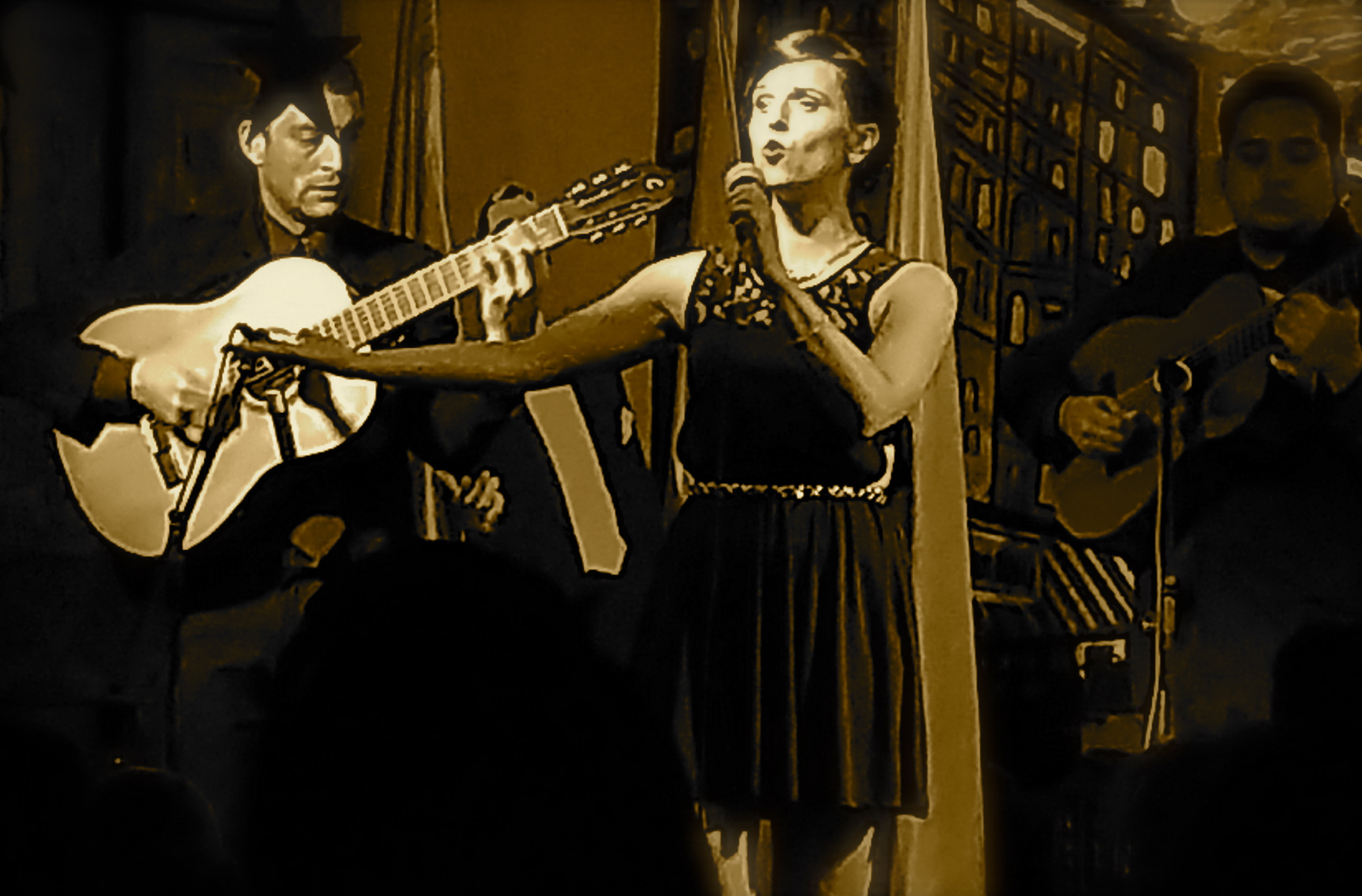A visit to Colombia to attend the Festival International de Tango de Medellín in June overlapped with a tour of the country by La Guardia Nueva, the guitar trio from Argentina that, earlier this year, won a first annual world competition for tango orchestras. They presented POR AMOR DEL TANGO, a CD featuring the singer Luz de Olano, who also fronted the tour. I had seen both previously in Buenos Aires, but separately (although she danced, I think, when I saw the trio at Esquina Homero Manzi). In Medellín, I attended some of their concerts at restaurants, bars and cultural centers; since, I have heard the album. Live, their concerts reminded me of the theatrical strain in early tango songs, which were often composed for skits called sainetes and whose influences included zarzuela, cuplé, and Italian opera. The CD is distinctly tragic, in the sublime sense, balanced and structured, of formal simplicity and complex emotion.
In concert, de Olano approaches a song as though it were a vignette, a dramatic device with a beginning, middle, and end, a snapshot of a personality in a defined situation, both vocally and as physical theater. “Se dice de mí ”, a 1943 milonga by Canaro/Pelay, is her most intricately honed set piece, a perpetually fresh crowd pleaser in which a fiercely assertive woman turns the ways she is spoken of by men back upon them. A whole scene could grow up around what she does with the song; she’s very much a character; you can imagine the dance number that would surround her in a movie or a play. De Olano knows how to play an audience; to address one and all in her banter; to respond to what comes from the crowd. She pulled off some difficult songs, even “Garganta con arena” (1993), the Cacho Castaña ode to Roberto Goyeneche so strongly identified with Adriana Varela. She made the distinctive “-ao” rhymes of Filberto/Discépelo’s “Malevaje” (1929) sound like the last gasps of a determined soul.
The repertory in Medellín included “Volver”, the Gardel anthem that has such resonance there, and tango standards like “Fumando espero”, “Nostalgias”, “Fuimos”, and “Por una cabeza”. Once or twice in a set, the trio performed an instrumental, making one realize how full and coherent a sound they had created behind the singer, how unified and yet distinct in its strands. Facundo Mercado (director and arranger), Bruno Ventura, and Luis Mario Rossi lay down a texture that is both driving and delicate; it is danceable, if one wishes; beyond that, remarkably varied, complex, and expressive. Rossi is on the guitarrón, a somewhat larger instrument, which adds a depth and range, beyond what might be expected, to their sound.
The CD has its own shape and aesthetic. I call it tragic because, although it is not at all foreboding, it unfolds song to song in a universe that concludes with the lyric: “…quiero morir en tus brazos” – “I want to die in your arms”. Not only does de Olano’s rendition of the song (Caldara/Soto’s 1951 “Pasional”) build inexorably to the moment, so does the force of the guitars; and moreover the album as a whole. It should be listened to in its intended order:
The nostalgia of “Sur” (Troilo/Manzi 1948) preps the tragic canvas on which two men will die in “Duelo criollo” (Rezzano/Bayardo, 1928); a slow sadness spreads in “Pedacito de cielo” (Francini/Stamponi/Expósito, 1942); a soul suffers in “Alma en pena” (Aieta/Jiménez, 1928); the woman of “Se dice de mí” vindicates her indignation; the melodic beauty of “Gricel” (Mores/Contursi, 1942) lessens the sorrow of a romantic loss, a mood voicelessly sustained by “A Don Roberto” (an original by Mercado); love aches from distance in “Lejos de ti” (Erazo, 1954); the lilt of vals softens the pain of “Tu pálida voz” (Carlo/Manzi, 1943); and Pasional rises, on de Olano’s voice, to its final desire.
POR AMOR AL TANGO is an unusually integrated experience, emotionally varied, but united by the insistence and variety of the guitars, the pace and coloration of the vocals, the progression of the tracks, and the selection of themes. Any track could stand on its own (“Alma en pena”, “Gricel”, “Lejos de ti” and “Pasional”, with its steady emotional surge, are exceptionally beautiful), but the cumulative effect is unbroken. POR AMOR AL TANGO is thirty minutes with a purpose and a dramatic vision, a worthy complement to its artists in concert, and vice versa.
Click links to follow Luz de Olano and La Guardia Nueva.
